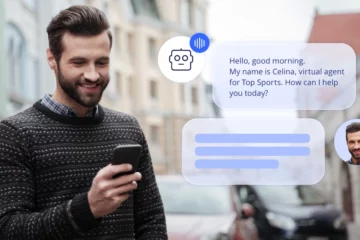In healthcare, one of the most common scenarios is waiting in virtual queues to schedule services or appointments. The reality is that health cannot wait. Fortunately, Generative AI is transforming how health institutions operate, reducing administrative burdens and cutting waiting times. Doctors, hospitals, and clinics are now exploring options to automate communications and appointment scheduling using Generative AI and voicebots.
Traditional methods for scheduling medical appointments and managing communications are often slow and labor-intensive, requiring significant human intervention. This not only places additional pressure on hospital staff but also leads to longer wait times and a higher potential for errors. While many institutions have adopted IVR solutions to streamline these processes, such systems have limitations. They often require patients to navigate long menu options via keypad, and their ability to redirect users to the appropriate department depends on predefined routes. This can result in long waits or repeated call transfers, depending on staff availability.
By leveraging AI-powered voicebots, healthcare providers can automate these tasks, offering patients a natural language self-service option for scheduling appointments and managing communications.
In this blog, we will explore how voicebots are revolutionizing medical appointment scheduling in the healthcare sector. We will discuss their benefits and the real impact of this technology on patient satisfaction.
From traditional to smart appointments
AI-powered voice chatbots can manage the entire process of scheduling medical appointments. Patients can call to request appointments, check availability, and confirm schedules without human intervention. The voicebot can ask about preferred dates and times, the reason for the appointment, and any other relevant information, processing this data to find the best available slot.
Chatbots, voice or WhatsApp, are designed to integrate with existing appointment management systems and medical records in healthcare facilities. This means the voicebot can access the availability of medical professionals, update schedules in real-time, and sync information with internal hospital or clinic systems. This integration ensures that information is always up-to-date and that there are no scheduling conflicts.
Additionally, bots can integrate with clients’ device calendars, sending automatic reminders about appointments. This helps reduce no-shows by ensuring patients receive timely notifications and can manage their appointments on their personal devices.
Additional benefits of using voicebots in healthcare
- Comprehensive patient data collection: Voice assistants can gather crucial patient information such as age, current medications, symptoms, and medical history to create personalized health profiles. These profiles facilitate accurate assessment of patient needs and help in recommending suitable specialists for consultations or follow-ups, enhancing the overall patient experience.
- Continuous accessibility: One major issue with scheduling appointments is limited hours, often restricted by the availability of medical assistants. An always-available voicebot means patients can schedule appointments at any time, without being limited by traditional office hours. This improves accessibility and convenience for patients, allowing them to manage their appointments more flexibly.
- Improved clinical workflow: By saving time for nurses and eliminating non-clinical tasks, voicebots can help reduce burnout and allow staff to focus on direct patient care.
- Discharge planning: Voicebot configurations can also help prepare patients for success post-discharge by providing crucial information and reminders.
- Automated responses to Frequently Asked Questions: Voice assistants can handle common queries related to appointments, such as costs, payment methods, and rescheduling, without interrupting the workflow of medical staff.
- Personalized human interaction: For some patients, the familiarity of a human-like voice can make the process of scheduling appointments more comforting and less stressful. Voicebots can be designed to offer a warm and empathetic interaction, helping patients feel more at ease.
Voicebots or chatbots, powered by AI, are transforming industries like insurance, e-commerce, or higher education, and healthcare is no exception. With these technologies, hospitals and clinics can offer more agile and accessible services. Patients benefit from greater flexibility and speed, and medical staff can focus on providing higher-quality care. AI automation is not only redefining how medical appointments are managed but also laying the groundwork for a future where technology and human care work together to improve the quality of healthcare.
If you have a use case for virtual assistant bots and need a technology partner to implement it, don’t hesitate to contact our team.



